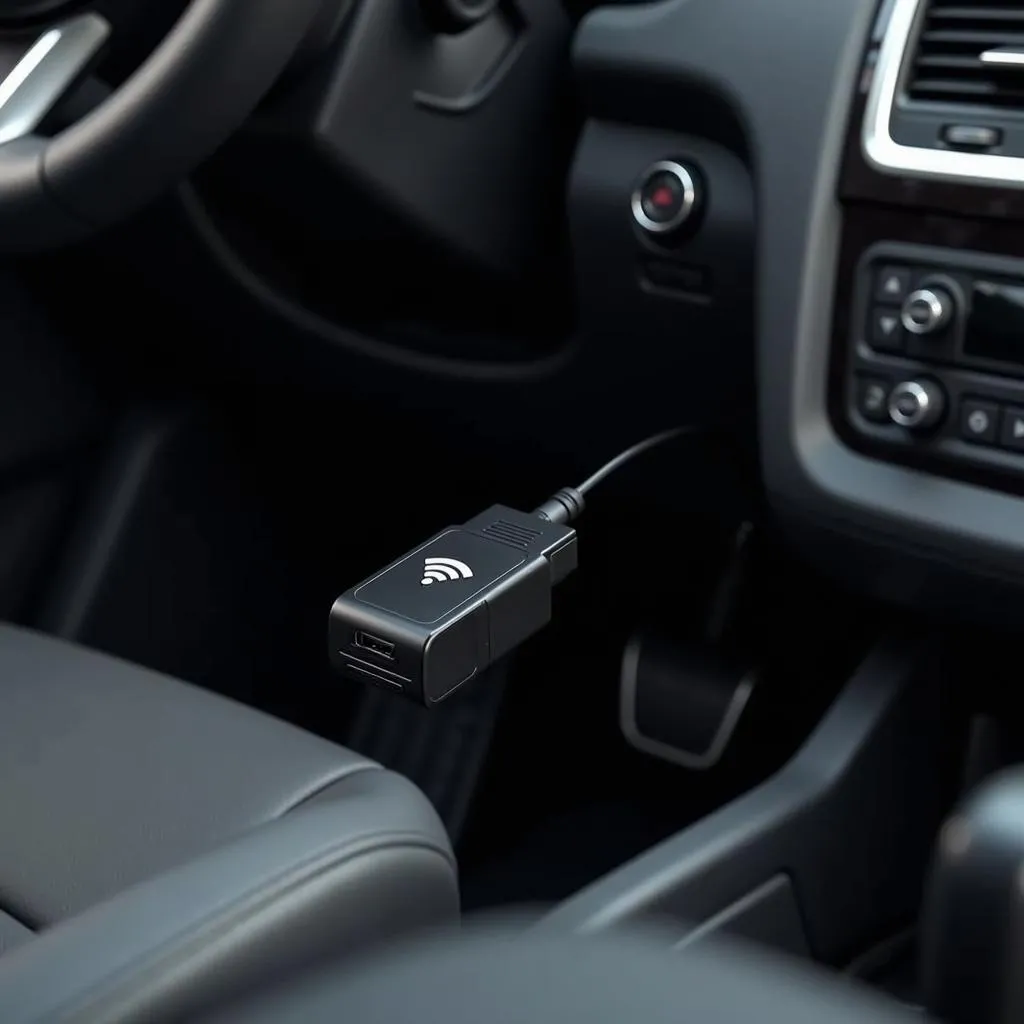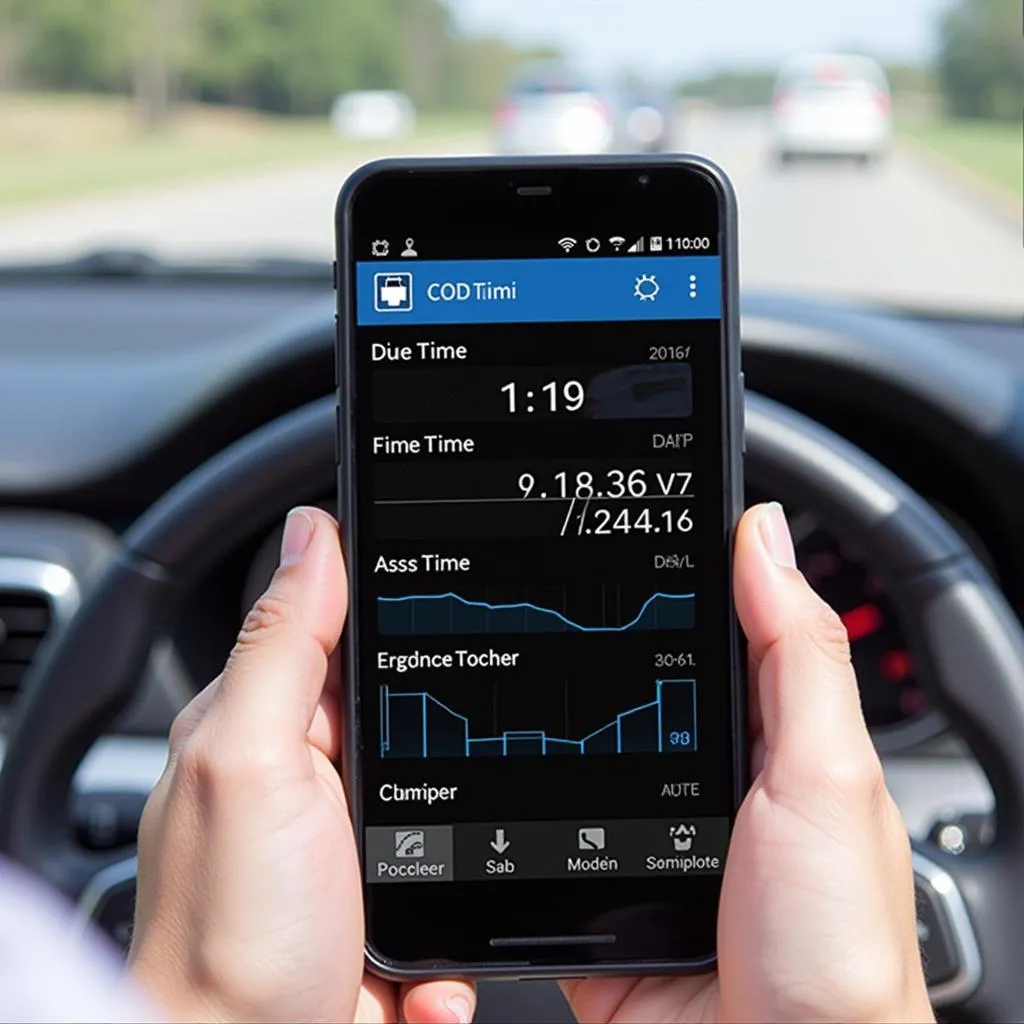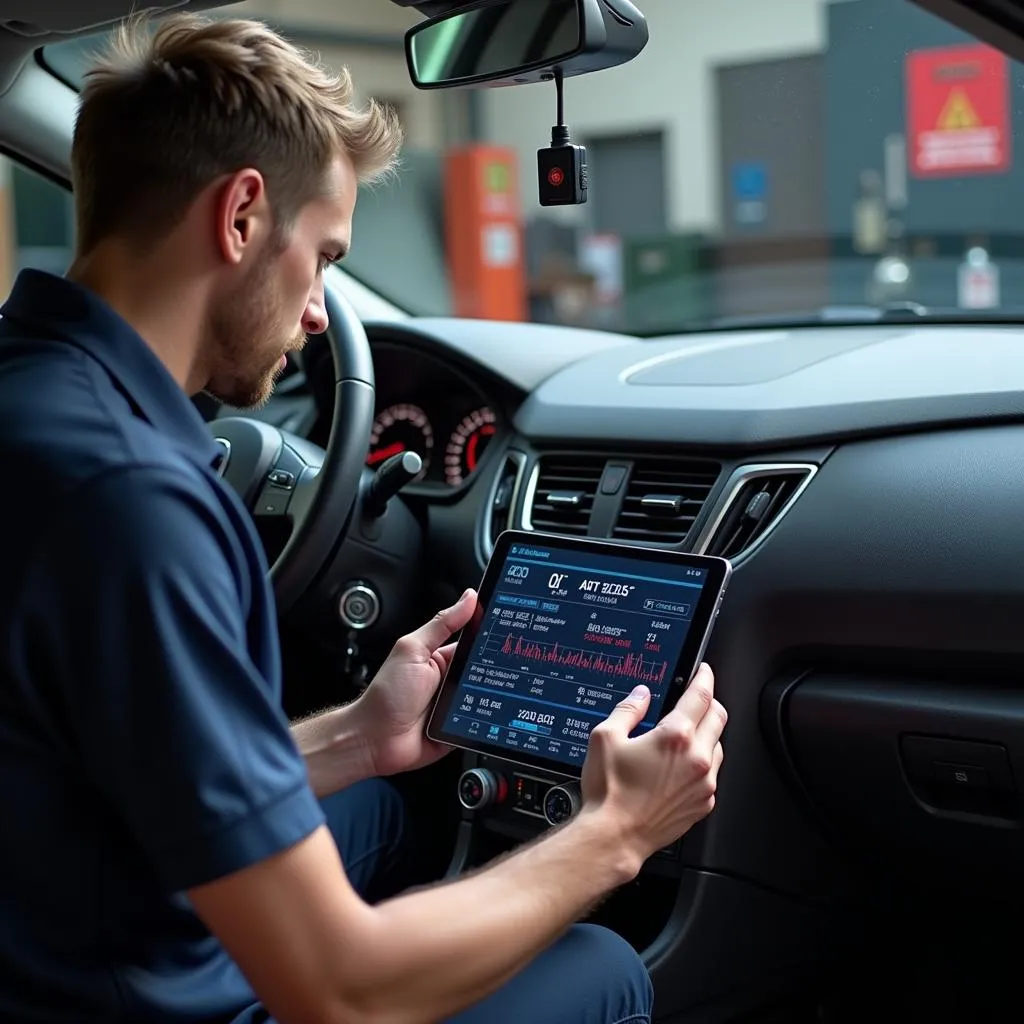An Obd Wifi Adapter is a small device that plugs into your car’s OBD-II port, allowing you to access your vehicle’s data wirelessly using your smartphone or tablet. This unlocks a wealth of information, empowering you to diagnose problems, monitor performance, and even customize certain features.
What Exactly Does an OBD WiFi Adapter Do?
Imagine having a direct line to your car’s brain – that’s essentially what an OBD WiFi adapter provides. By translating your vehicle’s complex data into an easy-to-understand format, these devices empower car owners to take control of their vehicle maintenance and diagnostics.
 OBD WiFi adapter plugged into a car's OBD-II port
OBD WiFi adapter plugged into a car's OBD-II port
Choosing the Right OBD WiFi Adapter
The market is flooded with various OBD WiFi adapters, each boasting unique features and compatibility. How do you choose the right one?
1. Compatibility: Your Car and Your Device
- Vehicle Compatibility: Ensure the adapter supports your car’s make, model, and year. Some adapters specialize in specific car brands, like a BMW OBD WiFi adapter, while others offer broader compatibility.
- Device Compatibility: Check if the adapter is compatible with your smartphone or tablet’s operating system (Android, iOS, or Windows).
2. Software Support: The Key to Unlocking Features
Most OBD WiFi adapters rely on third-party apps to function.
- Free vs. Paid Apps: Free apps often offer basic functionality, while paid apps provide more advanced features like live data monitoring, fault code clearing, and performance logging. Research apps like the Carly OBD WiFi adapter alternative for comprehensive options.
- App Features: Consider the features most important to you, whether it’s reading and clearing engine codes, monitoring fuel economy, or accessing advanced sensor data.
3. Data Logging and Real-Time Monitoring
- Data Logging: This feature allows you to record and analyze driving data over time, which can be helpful for tracking performance, diagnosing intermittent problems, or monitoring fuel efficiency.
- Real-Time Monitoring: For those who like to keep a close eye on their car’s vitals, real-time monitoring displays live data from various sensors, like speed, RPM, engine temperature, and more.
4. Security and Reliability
- Data Security: Choose an adapter and app that prioritize data security, especially if you plan on using features that access sensitive vehicle information.
- User Reviews: Check online reviews and forums for feedback on the adapter’s reliability, connection stability, and customer support.
 Smartphone showing car diagnostics app with an OBD WiFi adapter connected
Smartphone showing car diagnostics app with an OBD WiFi adapter connected
Benefits of Using an OBD WiFi Adapter
Owning an OBD WiFi adapter is like having a pocket-sized mechanic at your disposal.
- Diagnose Car Problems: Read and understand those cryptic “check engine” lights by identifying the fault codes yourself.
- Save Money on Repairs: Potentially avoid unnecessary trips to the mechanic by identifying minor issues you can address yourself.
- Monitor Car Performance: Track vital stats like fuel economy, engine performance, and battery health.
- Customize Driving Experience: Some adapters and apps allow for customizing certain vehicle features, like automatic door locking or adjusting lighting preferences.
- Peace of Mind: Enjoy peace of mind knowing you have a tool to quickly assess and address any car troubles on the go.
OBD WiFi Adapter vs. Bluetooth Adapter: Which One to Choose?
Both OBD WiFi and Bluetooth adapters offer similar functionalities but differ in their connection methods and range.
- OBD WiFi Adapters: These adapters create a WiFi hotspot that your smartphone or tablet connects to. They offer a longer range than Bluetooth, allowing you to use the device even when slightly away from your car.
- OBD Bluetooth Adapters: These adapters connect to your device via Bluetooth, offering a more stable connection but with a limited range.
The choice depends on your individual needs. If you prioritize range and plan on using the adapter for tasks that require moving around your car, WiFi is a better option. If you prefer a more stable connection for stationary use, Bluetooth might be suitable. You can find resources comparing options like ELM327 Bluetooth or WiFi OBD adapters to make an informed choice.
Exploring Advanced Features: Beyond the Basics
Some OBD WiFi adapters, coupled with specialized apps, open doors to a world of advanced functionalities, especially for car enthusiasts and tech-savvy individuals.
- Performance Tuning: Adjust certain engine parameters and monitor the results in real-time.
- Coding and Programming: Access and modify hidden vehicle features and settings.
- Advanced Diagnostics: Perform more in-depth diagnostics, such as reading manufacturer-specific fault codes.
Remember: Advanced features should be used cautiously and with proper knowledge. It’s best to consult your car’s manual or a qualified mechanic before making any significant modifications.
 Mechanic using an OBD WiFi adapter for car diagnostics in a professional workshop
Mechanic using an OBD WiFi adapter for car diagnostics in a professional workshop
Common Applications for OBD WiFi Adapters
OBD WiFi adapters have become indispensable tools for a variety of users:
- Car Owners: Diagnose problems, monitor car health, and track fuel efficiency.
- DIY Enthusiasts: Perform basic repairs and maintenance tasks themselves.
- Professional Mechanics: Use as a supplementary diagnostic tool in workshops.
- Fleet Managers: Monitor vehicle performance, track location, and optimize fuel consumption for entire fleets.
The Future of Car Diagnostics with OBD WiFi Adapters
As technology advances, OBD WiFi adapters are expected to become even more sophisticated and integrated into our driving experience. We can anticipate:
- Increased Compatibility: Support for a wider range of car models and advanced functionalities.
- Enhanced Security Features: Robust security protocols to protect vehicle data from unauthorized access.
- Integration with Cloud Services: Data logging, analysis, and sharing capabilities via cloud platforms.
- Predictive Maintenance: Leveraging data to anticipate potential problems before they arise, enhancing proactive maintenance.
Conclusion: Take Charge of Your Car with an OBD WiFi Adapter
An OBD WiFi adapter is a powerful tool that empowers car owners with knowledge and control over their vehicles. Whether you’re a car enthusiast looking to delve deeper into performance metrics or a casual driver wanting to understand and address those pesky warning lights, an OBD-II WiFi adapter can be an invaluable investment. Consider your individual needs, explore the options available, and unlock a new level of automotive awareness and control.
FAQs about OBD WiFi Adapters
1. Will using an OBD WiFi adapter void my car’s warranty?
No, using a reputable OBD WiFi adapter will not void your car’s warranty. These devices simply read data from your vehicle’s computer system and do not make any physical modifications.
2. Can I use an OBD WiFi adapter on multiple cars?
Yes, you can typically use the same OBD WiFi adapter on multiple cars, as long as they all have the standard OBD-II port. However, the available features and data might vary depending on the car’s make, model, and year.
3. Do I need an active internet connection to use an OBD WiFi adapter?
You do not need an active internet connection to use the basic features of an OBD WiFi adapter. However, some advanced features, such as software updates, data logging to the cloud, or accessing online databases for fault code definitions, might require an internet connection.
4. How often should I use my OBD WiFi adapter?
You can use your OBD WiFi adapter as frequently as you like. It’s a helpful tool for monitoring your car’s health, diagnosing problems, and tracking performance metrics.
5. What should I do if my OBD WiFi adapter is not working?
If your OBD WiFi adapter is not working, double-check the connection to both your car’s OBD-II port and your smartphone or tablet. Ensure the adapter is powered on and that your device’s WiFi is turned on. If problems persist, consult the adapter’s manual or contact the manufacturer’s customer support for assistance.
6. Can an OBD WiFi adapter improve my car’s fuel economy?
While an OBD WiFi adapter itself won’t directly improve your car’s fuel economy, it can help you identify driving habits or potential issues that might be negatively impacting your fuel efficiency. By monitoring parameters like fuel consumption, engine load, and throttle position, you can adjust your driving style or address any underlying problems to potentially improve your mileage.
7. Can I use an OBD WiFi adapter to track my car’s location?
Some OBD WiFi adapters, combined with specific apps, offer GPS tracking functionality. This can be helpful for locating your car in a parking lot, monitoring teen driving, or for fleet management purposes.
Need Help Choosing the Right OBD Adapter?
If you need help choosing the perfect OBD adapter for your needs, consider exploring these options:
- BMWhat WiFi OBD Adapter: Specifically designed for BMW vehicles, offering comprehensive diagnostics and coding capabilities.
- ELM327 Bluetooth or WiFi OBD Adapter: A popular and versatile option compatible with a wide range of car makes and models, available in both Bluetooth and WiFi versions.
For personalized assistance and expert advice, feel free to contact our team via WhatsApp: +1(641)206-8880, Email: [email protected]. We are available 24/7 to answer your questions and guide you towards the best solution. You can also visit us at our workshop located at 276 Reock St, City of Orange, NJ 07050, United States.
